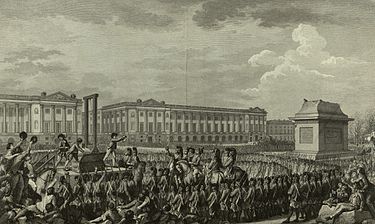It happened today - January 21, 2016
 On January 21, 1793, Louis XVI was guillotined for treason. How nice.
On January 21, 1793, Louis XVI was guillotined for treason. How nice.
I don’t mean it was nice that a man had his head cut off. And while I don’t think Louis was a very good king, I also can’t see him as a traitor. His response to the French Revolution was inept and indecisive, though I’m not sure there was anything he could have done. And I have little use for the French monarchy, though far less for the Revolutionary regime and Terror that followed.
My focus here, as his presumably was toward the end, was the actual guillotine. Symbol of bloody political madness, it was actually created with the specific goal of being humane and egalitarian. You see, prior to 1789 there was an enormous difference between the way nobles and commoners were executed. The former had their heads whapped off by trained swordsmen while the latter were burned, broken on the wheel (which is even worse than it sounds), or hanged, sometimes using the slow strangulation method where the drop doesn’t break your neck.
I’m not sure how true that last sentence actually is. I bet much of the time executions of the humble were carried out in a “let’s get this over with” spirit, or of mercy in extremis, and were pretty quick. Moreover, the trained executioners didn’t always get it right; it could take several hacks and be a messy and horrible business.
Anyway, along came a French physician and member of the National Assembly with the revolutionary idea of punishing everyone the same way for the same offences, including those bringing capital punishment, and doing it with a machine for simple decapitation. Ah, the spirit of progress. No more human touch. Now it’s push button remove bean.
Joseph-Ignace Guillotin did not actually design the device that bears his name, though he was on the committee that approved it. (As for the urban legend that he was guillotined, it was another doctor named Guillotin; the “real” Guillotine’s family petitioned the French government to rename the horrible thing and, when turned down, changed their own name. But J.I. Guillotin died of old age in 1814 and is buried in the famous Père-Lachaise Cemetery.) But it was approved and widely used.
Is it really nice? I’m not so sure. I mean, there aren’t a lot of great ways to be put to death. And I feel about the guillotine rather as I do about the electric chair, that it’s a classic example of the illusion of technique, that some mathematically precise science can transform everything about life for the better including the sudden deliberate ending of it.
Honestly, suppose you are about to be executed, either for something you really did or because Robespierre somehow got you in his demented clutches. Is the main thing about it the physical pain you will endure in the final minute or two? What about the psychological misery of contemplating the guillotine rising up, merciless and inexorable, just waiting to dispatch you mechanically, one more unit to be processed?
For me I expect and hope it would be the loss of all the life that would otherwise have awaited me. I’m not saying I want to be burned at the stake. Death by fiery heat strikes me as almost unutterably hideous, which is probably why hell is depicted as fire that inflicts all that pain without mercifully ending. I figure a quick hanging, a firing squad or an ax to the back of the head is about as good as it gets.
Incidentally, there’s a memorable scene in C.S. Lewis’ That Hideous Strength where the inventor of an even more scientific execution machine is put into his own creation and his final thought is that in his calculations of blood pressure he had underestimated the terror. But again, to me, a major problem with the guillotine is precisely it’s impersonal technical quality. If you’re going to kill me I’d prefer that it be personal. (And yes, that Lewis scene fittingly takes place within NICE, the National Institute of Coordinated Experiments – if you want to know more, read the trilogy.)
Death is necessarily personal because life is. To be dispatched efficiently, painlessly, seems to me in an odd way a denial of humanity. Certainly the French Revolution didn’t use the guillotine in a spirit of mercy or in a way that enhanced human dignity.
They really might just as well have exiled Louis XVI. As a rallying point for counterrevolution he would I expect have been as useless as he was a king; he made a better symbol than he ever did a monarch. But if that was too much to ask, I feel that using a good old-fashioned ax would actually have been much more humane and fitting.